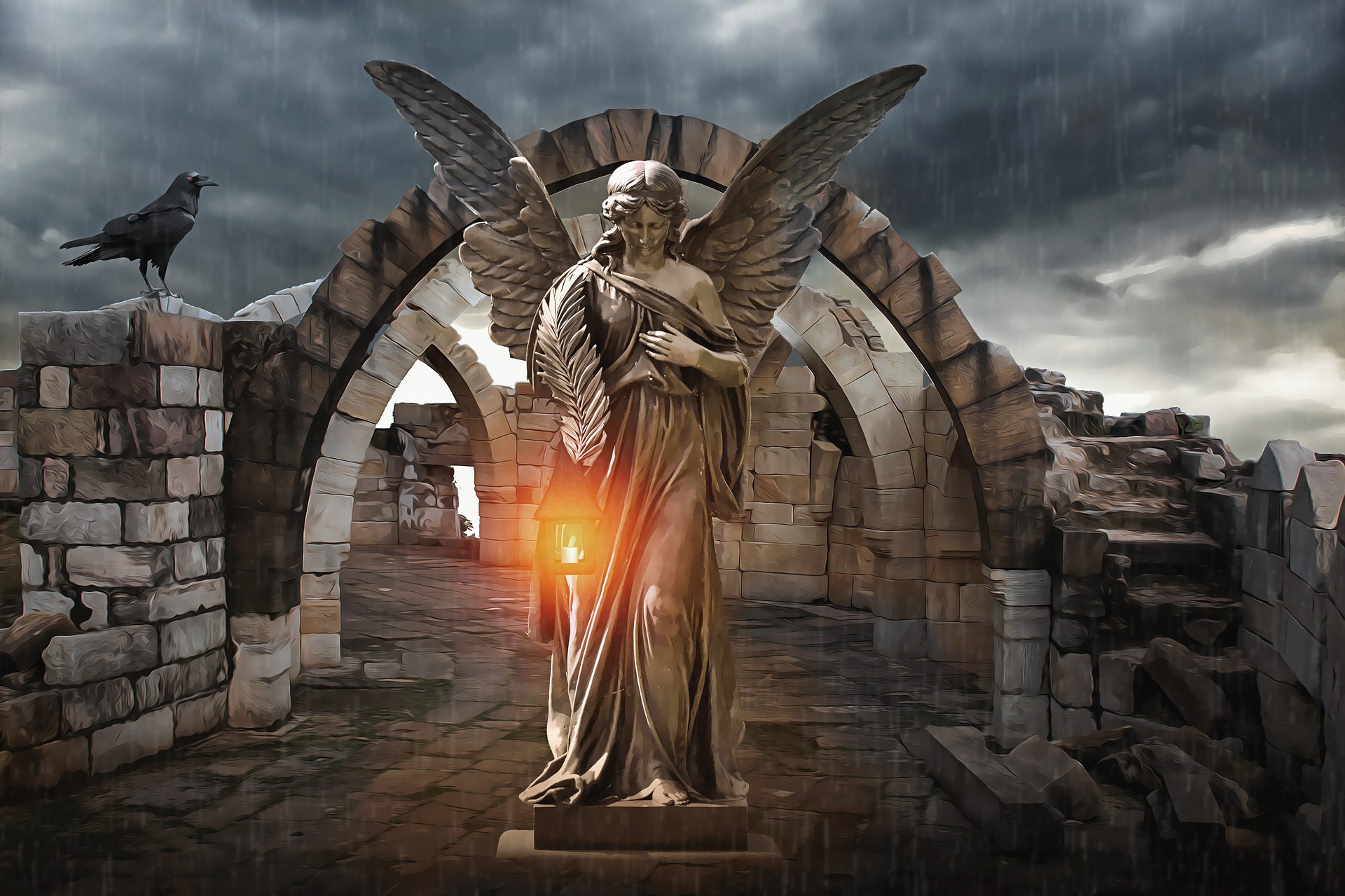 Submitted by Castiel on
Submitted by Castiel on

Can Angels possess a human?
The answer is actually pretty simple. It is the explanation that is a bit more complex. And the answer is YES, Angels can take possession of a human – but only if it is ordered to them to do so by God. Without God’s Will, they cannot and would not engage in such an action. Also noteworthy, is the fact that unlike the demonic, Angels of God actually respect the will of mankind, whereas the demonic do not. For an Angel to take possession of a human without that persons will or the Will of God, it would be an offense against God, and therefore, they would simply never do this. Let me explain.
Demons are still angels. They are “fallen” angels. When referred to as “fallen”, that does not necessarily mean that they have lost any of their power, or that they are lesser beings, it simply refers to their state of Grace. They are no longer receptive to God’s Grace, so they have literally “fallen from Grace”. They are still the same, powerful entities that they always were, they just simply choose to use their power and ability for more nefarious and malevolent purposes. In regards to their ‘strength’, or ‘power’, they still retain their rank. In Heaven, the Angels were organized by rank in regards to their powers and duties to God. In Hell, those same fallen Angels are organized very much like the military, with a clearly defined and set hierarchy.
In the book Interview With An Exorcist: An Insider’s Look At The Devil, Demonic Possession, and the Path to Deliverance, by Father Jose Antonio Fortea, ISBN 978-1-932645-96-5, an actual exorcist and theologian explains the history and state of the demonic in accordance with what I just mentioned above:
1. What is a demon?
A demon is a spiritual being of an angelic nature that has been condemned for eternity due to his rebellion against God. As pure spirits, demons are not made up of matter. Because they do not have bodies, demons are not inclined to any “sins of the flesh” (i.e., it is impossible for them to commit the sins of lust or gluttony) . The sins of demons are exclusively spiritual. But they can tempt human beings to sin in matters of the flesh.
Demons were not created evil. (In fact, it is impossible for God, who is Goodness itself, to create anything evil.) Remember: demons are just “bad angels.” After God created the angels, He tested their fidelity to Him before admitting them to the Beatific Vision, the sight ofHis very essence. For purely spiritual beings, this “seeing” of God’s essence would be a purely intellectual vision. Some angels obeyed the divine test; others did not. Those who disobeyed were irreversibly transformed into demons and cast out of heaven.
It may seem surprising that some angels would choose to hate God. But we need to understand that those who rebelled saw God no longer as a good-as the Good- but as the oppressor of their freedom. Hate was born as their wills resisted the call of God and held fast to the decision to leave the Father’s house.
Now war arose in heaven, Michael and his angels fighting against the dragon; and the dragon and his angels fought, but they were defeated and there was no longer any place for them in heaven. And the great dragon was thrown down, that ancient serpent, who is called the Devil and Satan, the deceiver of the whole world- he was thrown down to the earth, and his angels were thrown down with him (Rv 12:7-9) .
How can purely spiritual beings fight among themselves? What weapons do they use? Angels are spirits, so their battles must be purely intellectual. The only weapons that they can use are intellectual arguments. The angels gave reasons to the rebels for why they should return to obedience to God. The rebel angels countered with their reasons to support their position and spread their rebellion among the faithful angels. In this epic angelic battle, some who were inclined to rebel returned to obedience, while some of the faithful angels were seduced by the evil arguments of the rebels.
In art, demons are depicted as deformed and grotesque beings. This would seem appropriate given that demons have definitively decided on a destiny far from God. The interior loneliness in which they find themselves forever and their envy of the faithful who enjoy the Beatific Vision continually bring them face-to-face with their sins. They hate God, themselves, and all those who seek to serve God.
But not all suffer the same pains. Some angels were deformed more than others in the battle. Those who were more deformed suffer more; the least deformed suffer less. The intellects of the rebellious angels were deformed and darkened by the very reasons they used to justify the rebellion of their wills against God.
Their plight is similar to the moral debasement that humans can suffer through sin. We need to remember that we are composite creatures made up of soul and body. Aside from the sins that are proper to the body, the internal psychological process that leads a good person to end up in the Mafia or as a guard in a concentration camp or a terrorist is essentially the same as the sequence of acts of intellect and will that led to the fall of the bad angels. Though we are body-soul composites, we as humans have only to look into our own interior life to understand how we can fall into sin. In this light, the sin of the angels becomes more easily understood.
Most people do not understand that even the “good” Angels are pretty bad-ass. They are not the pretty little cherubs that you see during Valentine’s Day on Cupid cards, with tiny little wings and a goofy little bow and arrow. When God needs something done, for example, like the destruction of a city, such as Sodom and Gomorrah, guess what? He sends an Angel. As you saw in my previous article about Pyriel/Puriel/Uriel, he sent that bad-boy to attempt to kill Jacob, a holy man. That specific Angel is described as “pitiless”, and will ultimately be one of our judges at the end times. So to be an Angel of God is to be both beautiful and holiest of holy as well as savage and vicious and exacting. And from the same book, Father Fortea also goes into slight detail about how not all Angels or demons are equal in power:
2. Are all demons the same? No. We have already seen that each demon sinned in a certain way and with a determined intensity. While the angelic rebellion against God had its roots in pride, from this root other sins grew. This can be clearly seen during an exorcism, when the particular demons possessing the person display sins of anger, self-worship, and desperation, among others. Each demon has its own psychology and its own way of being. For example, some are talkative, others are mocking; some are proud, others are hateful. Even though they all turned away from God, some demons are more evil than others.
As St. Paul and the tradition of the Church indicate, we need to remember that there are nine hierarchies of angels (from highest to lowest) : seraphim, cherubim, thrones, dominions, virtues, powers, principalities, archangels, and angels. The superior hierarchies are more powerful, beautiful, and intelligent than the inferior ones. According to St. Thomas Aquinas, each angel is completely different from other angels. In sociological terms, there are no angelic “races”; rather, each one is its own species. As we have said, though, it is possible to group the angels into hierarchies (these hierarchies are also called choirs) since these groups form themselves into choirs that sing praises to God. Their praise is obviously not that of the voice, but rather a spiritual type of praise that comes from their will to know and love the Trinity.
Because some angels from each of the nine hierarchies sinned and transformed themselves into demons, a demonic hierarchy exists. In other words, there are demons that are principalities, virtues, powers, etc. Even though they are demons, they retain their particular angelic power and intelligence.
Exorcisms have shown that superior demons can have power over inferior ones. What does this power consist of? This is something that is impossible for us to know because we cannot see how one demon forces another to do something, since there is no body to push or force. Nevertheless, a more powerful demon can prevent a less powerful one from leaving the body of a possessed person during an exorcism. Even though the weaker demon is suffering and wants to leave, the stronger one may impede it.
So ultimately, this post goes out to anyone who ever wondered about the answer to this question. I apologize for only using the citations of one book in this post, but ultimately, I feel that Father Fortea did a good job explaining who and what demons are so that it could support the answer I have given. Furthermore, using nothing but simple logic, it would be rational to state that since demons can possess a human being, with demons actually being “bad” angels, that the “good” Angels would have that same ability. It stands to reason that the only difference would be the purpose for the possession. It is doubtful that an Angel of God would take over a person to cause them torment and agony, which a fallen Angel would utilize only the negative aspects of this ability. Hopefully, this has shed some light and insight onto why I believe Angels, good or bad, to be able to possess a person.